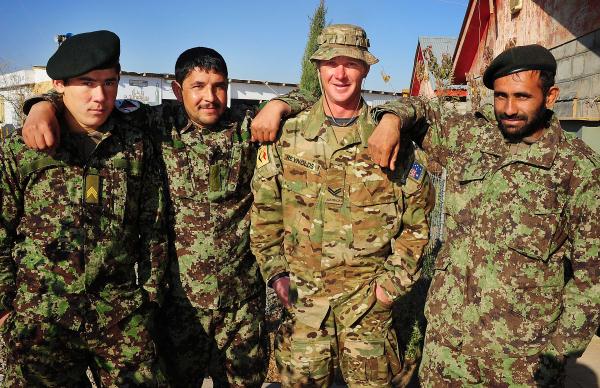DANGER never lurks far away for three Geelong soldiers based in Tarin Kot, Afghanistan.
The tension of living and working in a war zone is palpable, even down the phone line on what the three refer to as a “low-tempo day”.
Sergeant Nick Barrand, Lance Corporal Daniel Taylor and Corporal Tom Reynolds had already attended an early-morning briefing before speaking to the Independent.
But they were united in their message to their families and friends throughout Geelong: “We are here to do a job and we will get the job done”.
They are part of a 1500-strong Australian Defence Force contingent in Uruzgan province where they work to hand control of security to Afghan forces before withdrawing at the end of 2014.
Sappers Sgt Barrand, 36, and Lce Cpl Taylor, 27, are training and mentoring members of the Afghan National Army (ANA) 4th Brigade. Cpl Reynolds is a security advisor to the ANA.
One of main tasks for Sgt Barrand and Cpl Taylor is to help Afghan army personnel identify and disarm improvised explosive devices (IEDs), used by Taliban insurgents in their guerrilla war.
The soldiers live in a fortified base “behind the wire” with thick walls to thwart rocket attacks. Everyone kits up in full-body armour when moving to exposed positions.
“The ANA level of capability is pretty good but they’re working with outdated equipment compared to ours,” Sgt Barrand explained.
“We cover every possible variable in our training so when we go out on mobility tasks we can make sure the groups are clear.
“We also work to deny the insurgents their access to their weapons cache.”
The Taliban uses huge caches of weapons that Russian troops abandoned after withdrawing in 1989 from an ill-fated invasion.
Sgt Barrand’s is on his second Afghan deployment. Parents Reg and Jan are relieved he spends more time on the base this time.
He welcomed the opportunity through the Independent to let “people back home know what we are up to”.
“The main thing is that we know our families are behind us and support us. It’s tough here but everyone is tight and we can all see there is a lot of good to be done.”
Coincidentally, Sgt Barrand’s father taught Cpl Taylor at Corio Primary School.
“It’s amazing that we met up under these circumstances to find that connection,” Cpl Taylor laughed.
On his first deployment, Cpl Taylor was impressed with the willingness and enthusiasm of the Afghan recruits to learn.
“The locals are supportive because want a safer Afghanistan.
“Overall, the relationship is pretty good – I didn’t think they would be at this skill level.
“Mitigating the impact of the IEDs is the main weapon we have against the insurgents because it’s still one of biggest threats to locals and soldiers alike.
“We’re trying to teach the ANA guys to trust their own knowledge and skills because the best assets are your own eyeballs.
“There is always some sort of sign you can pick up on, from the way stones are piled to ground disturbance.
“The excitement of finding devices keeps the guys on patrol going.”
Cpl Reynolds’ second deployment – his first was East Timor – was another opportunity to do a job he loved.
“My wife, Tammie, and my family are happy for me to do what I like to do. Tammie knows I love the job.
“I know they get nervous but they stay supportive. It’s all new to them but, for me, it’s easier the second time around – it takes the mystery out of it.
“It’s not just a job and I can absolutely see progress. We have to stay focussed on what we’re doing and just keep going.”
Cpl Reynolds said the Aussies and the Afghans were beginning to understand each other.
“I’ve made friends with one of Afghan soldiers; we catch up almost every day. His English is much better, so we can have a proper conversation.”
Cpl Reynolds advises the ANAS on security issues, including admitting people to the base, manning sentry towers and searching vehicles.
He said the opportunity to catch up with Tammie and the rest of his family on a regular basis via Skype, email and phone calls made a big difference.
“We just need to know they’re okay and support us – that’s what gets us through.”
’We will get job done’: our three on frontline

Digital Edition
Subscribe
Get an all ACCESS PASS to the News and your Digital Edition with an online subscription
From the archives
15 years ago
11 February, 2011
Tourism lobbyists are seeking $30 million from State Government to build a Geelong Convention Centre within the next four years.
Victorian...









